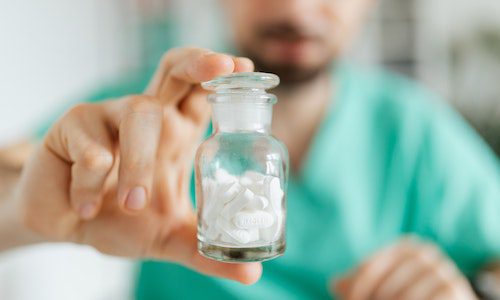The question of whether or not a person can become addicted to antidepressants does not have a simple yes or no answer. While antidepressants are not addictive like certain medications, such as benzodiazepines or opioids, and certainly not as addictive as illegal street drugs, such as methamphetamine or heroin, they can lead to dependence. When dependence develops, withdrawal symptoms occur when the person stops taking the drug; alternately, the person may be afraid to stop taking the drug for fear they will be unable to function.
What are Antidepressants?
Antidepressants are prescribed by medical professionals to treat depression ranging from moderate to severe. WebMD explains that they work within the brain by balancing chemicals such as noradrenaline and serotonin, that affect emotion and mood. When people are depressed, their brain does not produce enough of these chemicals. Unlike many other kinds of medications, antidepressants do not work immediately. They can take up to several weeks to begin to cause noticeable effects.
Different Forms of Antidepressants
According to the Mayo Clinic, the most commonly prescribed types of antidepressants are called SSRIs (selective serotonin reuptake inhibitors) and include citalopram (Celexa), fluoxetine (Prozac), escitalopram (Lexapro), paroxetine (Paxil, Pexeva), and sertraline (Zoloft).
Other forms of antidepressants include:
- SNRIs (Serotonin and norepinephrine reuptake inhibitors) – duloxetine (Cymbalta), venlafaxine (Effexor XR), levomilnacipran (Fetzima), and desvenlafaxine (Pristiq)
- TCAs (Tricyclic antidepressants) – amitriptyline, doxepin, and desipramine (Norpramin), nortriptyline (Pamelor), and imipramine (Tofranil)
- NASSAs (Noradrenaline and specific serotonergic antidepressants) – bupropion (Wellbutrin SR, Wellbutrin XL, others), trazodone, mirtazapine (Remeron), vilazodone (Viibryd), and vortioxetine (Trintellix)
- MAOIs (Monoamine oxidase inhibitors) – isocarboxazid (Marplan), phenelzine (Nardil), tranylcypromine (Parnate), and selegiline (Emsam)
Antidepressant Abuse
Unlike many commonly abused drugs, antidepressants do not cause the user to get a feeling of euphoria or crave another dose. This is one reason many people believe these drugs are not addictive. However, since the effects of the medication are not felt for several weeks, many patients think it is not working and take more than the prescribed dose. When they do this, they increase the chances of developing a tolerance to the antidepressant right away, which can lead to the need for increasingly higher doses (and thus increase the chance for negative side effects). Others abuse the drug by taking it with alcohol to increase its effect. Doing this is very dangerous and can make depression worse or cause an overdose.
Antidepressant Overdose
It is possible to overdose on antidepressants by taking too many pills. It is more common to overdose when a person mixes antidepressants with alcohol or another drug, either prescribed or illicit. The most common and also more severe form of antidepressant overdose is linked to tricyclic antidepressants. An article in Medical News Today reports that TCAs are listed in the top twenty-five medications linked to the greatest number of overdose deaths. SSRIs, SNRIs, and other forms of antidepressants are also included in the list. Antidepressants are the third most common cause of poisonings of adults in the United States.
Signs and Symptoms of an Antidepressant Overdose
Antidepressant overdose symptoms range from mild to severe. If the symptoms are severe and go untreated, the overdose may be fatal. The severity of the symptoms depends on the type of antidepressants taken, the amount that was taken, and whether or not they were taken with alcohol or another drug.
Nausea, headache, vomiting, and drowsiness are mild symptoms of an overdose. Other symptoms include:
- Blurred vision
- Dilated pupils
- Fever
- High blood pressure
- Confusion
- Shakiness or tremors in the limbs
Severe symptoms include a rapid heartbeat, seizures, shaking, and hallucinations. Additional severe symptoms are:
- Difficulty breathing
- Low blood pressure
- Coma
- Cardiac arrest
- Death
In some cases, if a person takes too many antidepressants or mixes them with drugs or alcohol, serotonin syndrome may occur. This happens when too much serotonin is produced, and it accumulates in the body. If left untreated, serotonin syndrome can be fatal.
You Are Not Alone
Many people with a substance use disorder feel like they are alone. If you or a loved one is struggling with an addiction to drugs or alcohol, you are not alone. Help is available. At Canyon Vista Recovery Center, located in Mesa, Arizona, our skilled staff use a combination of clinical, medical, psychiatric, and holistic care to treat your disease. We teach you the skills you need to live a clean and healthy life.





